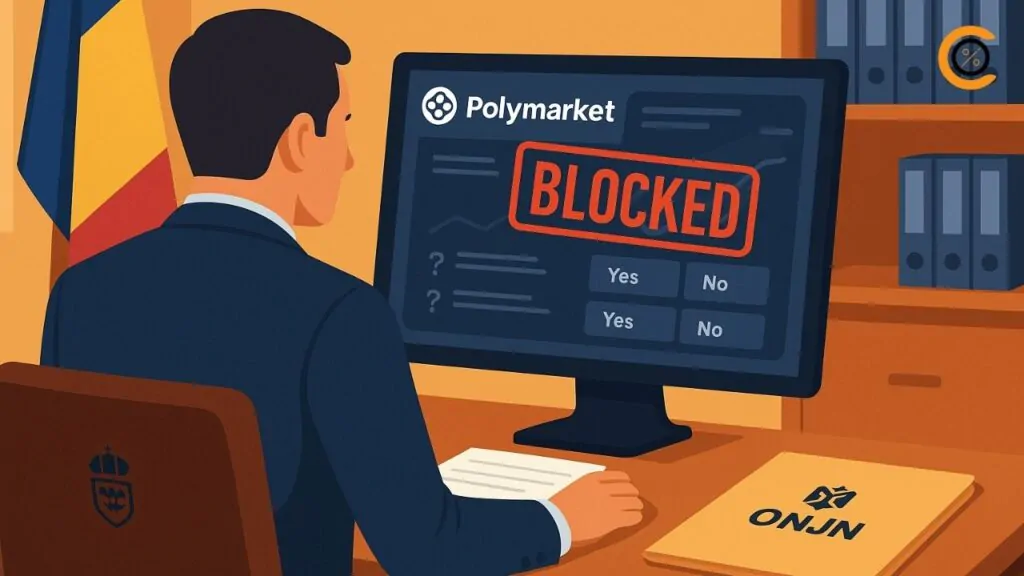- •Romania’s gambling regulator (ONJN) has blacklisted Polymarket, calling it an unlicensed crypto betting platform.
- •The decision followed $600 million in wagers during Romania’s presidential and local elections.
- •ONJN emphasized that betting in crypto still qualifies as gambling and must be licensed under national law.
Romania’s National Office for Gambling (ONJN) has officially blacklisted the blockchain-based prediction market Polymarket, describing its activity as unlicensed gambling rather than legitimate event trading. The decision, made on October 29, 2025, follows what the regulator called a surge in crypto betting linked to the country’s recent presidential and local elections.
According to ONJN’s statement, Polymarket’s trading volume during the election period exceeded $600 million, with roughly $15 million tied specifically to the Bucharest mayoral race. While the platform promotes itself as a place for users to “trade on future events”, authorities say the activity clearly falls under the legal definition of gambling, since users place stakes on uncertain outcomes with the intent to profit.
ONJN Labels Polymarket as Unlicensed Gambling
The ONJN clarified that Polymarket’s model represents “pariuri în contraparte”; counterpart betting, in which users wager against one another instead of the platform itself. Officials emphasized that this structure still qualifies as gambling under Romanian law, regardless of whether wagers are placed in fiat currency or crypto.
In a detailed statement, ONJN President Vlad-Cristian Soare said the move “is not about technology, but about the law”. He explained that blockchain-based interfaces cannot exempt operators from existing regulations, adding that the platform operates without a license, outside fiscal oversight, and without player protection or anti-money laundering mechanisms.
The regulator also warned that labeling such activity as “trading” or “prediction markets” creates a dangerous precedent. By doing so, operators could bypass the state’s monopoly on gambling and evade obligations such as tax payments, data reporting, and integrity checks. ONJN stated that Romania’s internet providers will now be required to restrict access to Polymarket for residents.
Related read: Rabby Wallet Moves Toward DeFi Expansion With Polymarket Integration
A Global Pattern of Regulatory Pushback
Romania’s enforcement aligns with a growing international trend against unlicensed crypto betting platforms. Polymarket was previously fined by the U.S. Commodity Futures Trading Commission (CFTC) in 2022 for running unregistered derivatives markets and was forced to block American users. Similar actions have been taken by regulators in France, Belgium, Poland, Singapore, and Thailand.
Despite these restrictions, Polymarket continues to attract attention. Reports suggest that the company, backed by Intercontinental Exchange, parent of the New York Stock Exchange, plans to reenter the U.S. market with limited sports-based markets later this year. However, ONJN’s decision underscores that Romania will not tolerate any form of unlicensed gambling, regardless of how it is framed or technologically packaged.
Also read: Asset Tokenization Roadmap Malaysia: A Step Toward Digital Finance
What This Means for Romania’s Crypto Landscape
The ONJN’s decision highlights Romania’s intent to keep the online gambling sector strictly regulated and compliant. It also serves as a reminder that blockchain innovation cannot override national laws, especially when it comes to activities tied to wagering and public finance.
While Polymarket’s model has gained popularity globally, Romania’s stance reinforces the line between financial speculation and gambling. For now, users in the country will find the platform inaccessible once internet restrictions take effect, and promoting or participating in similar unlicensed platforms could result in penalties under national law.
The ONJN summed it up clearly: whether bets are placed in lei or crypto, they are still bets, and they must operate within the law.







